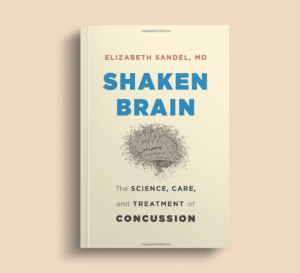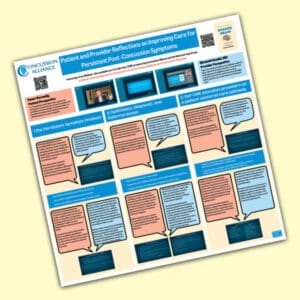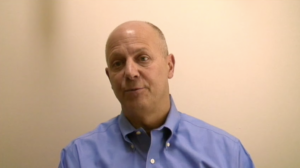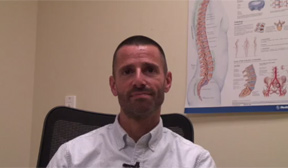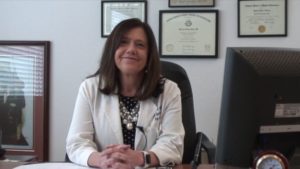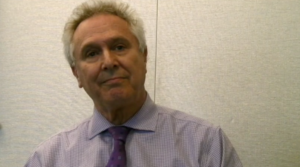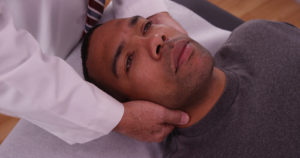Treatment and Prognosis after a Concussion

People who have experienced a concussion (a mild traumatic brain injury) may improve rapidly, but some will continue to have persistent and debilitating symptoms. While acute concussion symptoms tend to go away on their own after a few weeks, more chronic symptoms such as headaches can continue, lasting for weeks, months, or even years.
Chronic Post-Concussive Symptoms are Not a Single Medical Condition
Treating these persistent symptoms involves treatments to relieve their individual manifestations, even when the underlying cause of each symptom isn’t always clear. Therefore, we can’t lump together chronic post-concussive symptoms as one medical condition to treat, as we do, for example, when prescribing an antibiotic for pneumonia. However, medications and therapies can often successfully treat individual symptoms.
Exercising, regulating sleep-wake cycles, and other wellness interventions can also help with recovery. Physical medicine and rehabilitation physicians (physiatrists) are experts in treating brain injuries and painful disorders in the early and late stages after a brain injury, whether mild or severe.
Along with other rehabilitation providers, they educate patients on self-care activities, individualized depending on the patient’s age, associated conditions, and abilities.
Common Treatments for Persistent Concussion Symptoms
Medications
Over-the-counter and prescription medications can address many of the common symptoms that occur following a concussion, such as headaches, dizziness, and insomnia. Physiatrists often utilize more than one medication or treatment modality to address post-concussion symptoms. They frequently refer patients to physical therapy, speech therapy, neuropsychologists, or to other rehabilitation providers for additional, non-medication treatments.
Physical Therapy
Physical therapy and therapeutic treatments such as heat and ice can address the underlying cause of certain types of headaches, backaches, and neck pain that are common after a concussion.
One type of rehabilitation therapy, called the canalith-repositioning procedure (also called the Epley maneuver), specifically addresses the dizziness or vertigo (a spinning sensation) caused by dislodged gravity-sensing crystals in the ear. These crystals can end up in the wrong place from a blow to the head.
Vestibular rehabilitation therapy addresses vertigo and dizziness caused by injury to the systems for equilibrium and balance. Specialty-trained physical therapists provide this type of therapy.
Cognitive Rehabilitation Therapy
Some cognitive impairments, such as reduced attention, concentration, memory, and information processing, can improve when other problems such as painful conditions are addressed. However, if these impairments continue, they are likely caused by injury to frontal and temporal lobe regions of the brain. Cognitive rehabilitation therapy can help. Speech-language pathologists provide this type of therapy through cognitive-linguistic (language-based) evaluations followed by specialized interventions based on these evaluations. Neuropsychological evaluations completed by specially-trained psychologists may also provide a roadmap for addressing cognitive impairments.
Neuropsychology
Neuropsychologists can evaluate and recommend treatments for people with cognitive symptoms and alterations in mood, including anxiety and depression, as well as associated conditions such as chronic pain. Neuropsychologists or other psychologists may provide these interventions for mood disorders and associated conditions:
Cognitive Behavioral Therapy (CBT)
CBT has been found to be useful in treating many physical and psychological PCS symptoms, like headache, dizziness, insomnia, and other sleep disorders.
Psychotherapy
Psychotherapeutic interventions can be effective for treating depression and anxiety that can delay or complicate recovery after a concussion.
Alternative or Complementary Therapies
Alternative or complementary therapies may effectively treat headaches and other painful conditions common in patients with persistent post-concussion symptoms. These treatments might include chiropractic care, acupuncture, massage therapy, light therapy, and craniosacral therapy. Cannabinoids (THC and CBD and other cannabis derivatives) may offer alternative treatments for conditions such as chronic pain and insomnia. However, we still need more research to establish the safety and effectiveness of these alternative treatments.
Prognosis for Persistent Symptoms after a Concussion
The prognosis for persistent symptoms after a concussion is good, especially if patients receive medical interventions and education about self-care approaches early. Some studies suggest that about half of people with a history of concussion still experience some symptoms three months after their injury, but at a year that number has dropped to about one in ten people. For the majority of people, concussion-related symptoms go away within a year of the injury. The numbers may be even lower for those who get early intervention. Unfortunately, many do not receive care or comprehensive and effective care until symptoms become chronic.
Of course, for those experiencing continuing symptoms that are not responsive to treatment, these general statistics are not helpful or reassuring. Nevertheless, it is important for care providers to intervene early and try a variety of treatments, because different patients respond differently to interventions.
Factors Related to Longer Concussion Recovery Times
Several studies have looked at what factors contribute to long recovery times and the incidence of persistent post-concussive symptoms. Some factors appear to be more closely associated with a tendency to develop chronic symptoms after a concussion:
Age
Children under eighteen and seniors over sixty have more symptoms and longer recovery times compared to non-senior adults.
Developmental Disability
Children with learning disabilities and attention deficit hyperactivity disorder (ADHD) are statistically more likely to have longer recovery times or poorer recovery.
Psychological factors
Pre-existing history of depression and post-injury depression, post-injury stressors, and expectations of a poor recovery are correlated with higher rates of chronic symptoms and longer recovery times.
Previous Brain Injury, including Concussion
Recovery is lengthened with each successive brain injury, and shorter times in between an injury to the brain are correlated with longer recovery times.
Webinar and Interviews about Concussion Treatment and Prognosis
Physiatrists help people with brain injuries rehabilitate by treating the symptoms and conditions that do not resolve quickly. I provide other content on my website and address treatment and prognosis in a recent webinar that you can access here.
Interviews with a number of other physiatrists about their treatment approaches can also be viewed below.
You Might Also Like
Patient and Provider Perspectives on Improving Care for Post-Concussion Symptoms
This poster, created for the International Brain Injury Conference in New York in Sept 2022, offers various perspectives on how to improve concussion care. Attached are a reformatted poster presentation and related webinar links.
Managing Concussion-Related Pain
Dr. Steven Moskowitz is a physiatrist specializing in pain management. He discusses the various painful conditions, including neck pain and headaches, that occur at high frequency after concussion and related trauma. He advocates for a biopsychosocial approach to the evaluation and treatment of these conditions.
Concussion in Youth Sports
Dr. Andrew Judelson, a physiatrist and sports medicine physician at Spaulding Rehabilitation Hospital, discusses sports-related concussion evaluation and treatment at his outpatient clinic on Cape Cod.
Workers with Concussions
Dr. Maureen Miner is a physiatrist and an expert in brain injury medicine. She discusses her approach to patients with concussion and more severe brain injuries who need specialty care and referral to other specialists for evaluation and treatment.
The Post-Concussion Syndrome
Physiatrist Dr. Mel Glenn discusses the evaluation of the many symptoms that are part of a chronic condition called post-concussion syndrome or disorder that occurs in some patients after a concussion. He offers advice on the treatment of headaches, sleep disturbances, and other conditions.
Is Concussion a Diagnosis?
Clinicians like me say that concussion requires a clinical diagnosis based on the history of what happened to produce the symptoms. However, because these same symptoms appear in other conditions, and we don’t have reliable biomarkers, diagnosing a concussion can sometimes be a challenge. The lingering effects of a mild brain injury can also continue as a chronic condition, often referred to as post-concussion syndrome or persistent post-concussion symptoms, that still require treatment.
Keep up to date
Get updates on the latest in concussion, brain health, and science-related tools from Dr. Elizabeth Sandel, M.D.
By clicking SIGN UP, you agree to receive emails from Dr. Sandel and agree to our terms of use and privacy policy.
Get the book!
